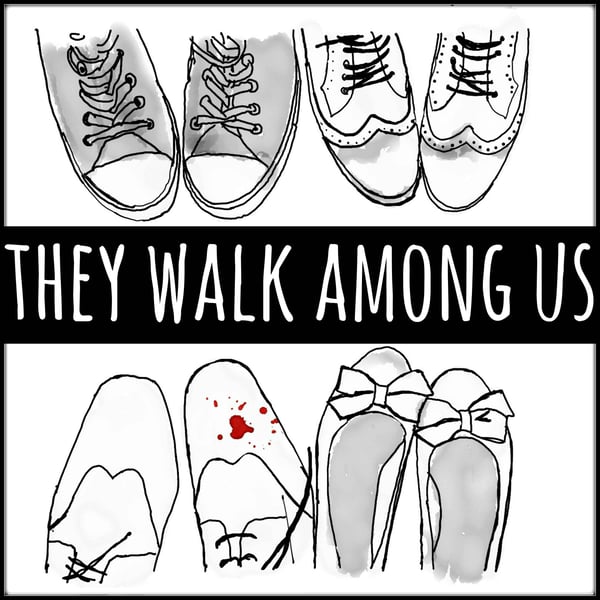Unsolved / Hannah Deterville / Kelso Cochrane
They Walk Among Us - UK True Crime
They Walk Among Us
4.6 • 6.6K Ratings
🗓️ 22 August 2018
⏱️ 34 minutes
🧾️ Download transcript
Summary
On January 2, 1998, 15-year-old Hannah Deterville left her home in Queens Park, London, to meet a friend. She never came home...
*** LISTENER CAUTION IS ADVISED ***
This episode was researched and written by Benjamin Fitton.
Narration, audio editing and production direction also by Benjamin Fitton. Script editing, illustrations and production direction by Rosanna Fitton.
More information can be found on our website at http://theywalkamonguspodcast.com
For early advert-free access and other extras, visit https://www.patreon.com/TheyWalkAmongUs
MUSIC:
Thoughtful by Lee Rosevere
Easy Life by Lee Rosevere
I Thought Of Pills by Lee Rosevere
In A Moment by Lee Rosevere
Old Regrets by Lee Rosevere
Completely Lost by Lee Rosevere
Reflections by Lee Rosevere
Gone by Lee Rosevere
Music sourced from http://freemusicarchive.org - used under an Attribution License - http://creativecommons.org/licenses/by/4.0/
SOCIAL MEDIA:
Twitter - https://twitter.com/TWAU_Podcast
Facebook - https://www.facebook.com/theywalkamonguspodcast/
Instagram - https://www.instagram.com/theywalkamonguspodcast/
Acast - https://www.acast.com/theywalkamongus
Support this show http://supporter.acast.com/theywalkamongus.
Hosted on Acast. See acast.com/privacy for more information.
Transcript
Click on a timestamp to play from that location
| 0:00.0 | Welcome to Season 3, Episode 8 of They Walk Among Us, a podcast dedicated to UK True Crime. |
| 0:23.5 | Listener caution is advised, as this episode contains adult themes and descriptions |
| 0:28.9 | that some listeners may find distressing. |
| 0:37.4 | On January 2nd, 1998, 15-year-old Hannah Duterville left her home in Queens Park, London, |
| 0:45.3 | to meet a friend. She never came home. |
| 0:52.3 | The roots of the Notting Hill Carnival in London date back to the late 1950s, when both |
| 1:02.6 | Brixton and Notting Hill had seen a considerable influx of people from different countries. |
| 1:08.3 | The government encouraged emigration to Britain as after the Second World |
| 1:12.5 | War the countries within it faced a labour shortage. Thousands of West Indian immigrants |
| 1:18.2 | join the working class alongside scores of Irish, Spanish and Greek workers. Living conditions |
| 1:25.0 | were cramped and often accommodation had little or no running water, no indoor toilets, no electricity. |
| 1:32.7 | This influx of new cultures wasn't always accepted. If you were black, you were often met with racism |
| 1:39.1 | and denied the same housing and employment opportunities as someone from the white working class. |
| 1:45.0 | Not only pubs, but some government-run agencies where you would find work and housing, |
| 1:51.0 | displayed signs which read, no Irish, no coloured, no dogs. |
| 1:56.0 | Tensions boiled over after a marked increase in attacks on black families by far right groups. |
| 2:02.6 | These included the White Defense League and Oswald Mosley's Union Movement. |
| 2:08.6 | These groups regularly distributed pamphlets that displayed slogans like, |
| 2:13.6 | Take Action Now, Protect Your Jobs, Stop Colored coloured immigration, and houses for white people, |
| 2:20.3 | not for coloured immigrants. This eventually led to the race riots during August and September |
| 2:26.3 | in 1958. |
| 2:28.3 | Around midnight on May 17th of the following year, Kelso Cochran, an Antiguan immigrant in his early 30s, was |
... |
Please login to see the full transcript.
Disclaimer: The podcast and artwork embedded on this page are from They Walk Among Us, and are the property of its owner and not affiliated with or endorsed by Tapesearch.
Generated transcripts are the property of They Walk Among Us and are distributed freely under the Fair Use doctrine. Transcripts generated by Tapesearch are not guaranteed to be accurate.
Copyright © Tapesearch 2025.

